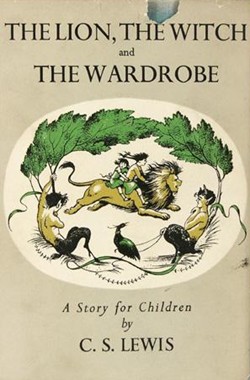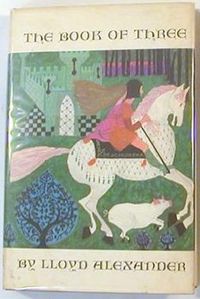Stories Of Sacrifice
 Recently I read an old blog post at MBT Ponderers noting that the two most recent YA blockbuster series, Twilight and Hunger Games, featured self-sacrificial heroes. Add in Harry Potter, a series the author hadn’t read, and I think there’s something to the idea that self-sacrifice is appealing.
Recently I read an old blog post at MBT Ponderers noting that the two most recent YA blockbuster series, Twilight and Hunger Games, featured self-sacrificial heroes. Add in Harry Potter, a series the author hadn’t read, and I think there’s something to the idea that self-sacrifice is appealing.
C. S. Lewis was particularly good at weaving self-sacrifice into his stories. It, of course, is crucial in the (traditional) opening book of Narnia–The Lion, the Witch, and the Wardrobe. In The Voyage of the Dawn Treader Reepicheep proves to be the person willing to sacrifice himself for others–in this case, to awaken the lost lords. Then Polly and Digory perform sacrificial acts in The Magician’s Nephew.
Interestingly, in this sixth installment of the Narnia books, the antagonist, Jadis, is guilty of annihilating the people on her world to prevent her own defeat–the precise opposite of self-sacrifice.
This quality of giving oneself over to danger or death for the sake of others is key in The Lord of the Rings, too. Gandalf is most obvious–standing against the Balrog so the rest of the Fellowship can escape the mines of Moria.
Of course there is discussion whether or not Gandalf actually died in the battle, but that same discussion took place regarding Harry Potter when he faced Voldemort. Perhaps the actual dying isn’t as important as the willingness to do so.
Which brings up Frodo. He was sacrificial in that he willingly faced unspeakable danger and insurmountable temptation, with no idea that he would survive. Yet he moved inexorably forward. Until the end. His failure and his escape, however, don’t diminish his sacrifice. They make it all the more poignant, perhaps.
 The Chronicles of Prydain by Lloyd Alexander also utilize the theme of sacrifice. In The Book of Three, for example, Gurgi who is injured, offers to stay behind so those he is traveling with can escape capture. Taran, the protagonist of the story, sacrifices a home in the valley of Medwyn in order to warn others of the impending attack by the Horned King. Ultimately, three of his traveling companions stand to fight the overwhelming force so that Taran can achieve his goal.
The Chronicles of Prydain by Lloyd Alexander also utilize the theme of sacrifice. In The Book of Three, for example, Gurgi who is injured, offers to stay behind so those he is traveling with can escape capture. Taran, the protagonist of the story, sacrifices a home in the valley of Medwyn in order to warn others of the impending attack by the Horned King. Ultimately, three of his traveling companions stand to fight the overwhelming force so that Taran can achieve his goal.
What is it about sacrifice that is so compelling? The easy answer is that it mirrors Christ’s sacrifice, and each of these stories is an echo of the Great Story. But that doesn’t explain why sacrifice resonates with us as readers. Why do readers care that a vampire boy is willing to deny himself for the girl he loves? Or that she is willing to walk into danger to be with him?
Christ Himself said, “Greater love has no one than this, that one lay down his life for his friends” (John 15:13). Do stories of sacrifice resonate with readers, then for the simple reason that we recognize that great love? Or could it be that we actually desire that great love for ourselves? Isn’t one cry of the human heart to be loved, to be valued at that level?
My instinctual idea is to say that memorable stories include sacrifice and great stories take it one step further–showing sacrifice by the most noble for those less so, thus mirroring Christ’s death for us “while we were yet sinners.” Aslan dying for the traitor Edmund is the prime example.
What are your thoughts? Does a sacrificial character make a story more memorable? Do sacrificial acts connect you more deeply to the story?
What are some more recent stories that utilize self-sacrifice, or is that lacking in current Christian fiction?
I’ll start, though I won’t give details because that would spoil a story that hasn’t been out long yet. In Shannon Dittemore’s Angel Eyes there is a notable example of self-sacrifice. Now I have to wonder if that’s one of the reasons I love that book so much.
Your turn. 😉











































Well, if you want self-sacrifice, there’s A Tale of Two Cities. And the Scarlet Pimpernel (LOVE that book!).
I’m still trying to catch up with Christian spec fic, so I’m not sure how widespread it is. But so far, every book I’ve read has some kind of self-sacrifice in it, sometimes to a ludicrous degree. It’s like the author is grabbing me by the ear, jamming my nose to the page and going, “LOOK! It’s a picture of Jesus! SEE? SEE?” and I’m wincing and saying, “Yes, yes, now get on with the story!”
Reality’s Ascent did this with the death of one of the main characters. The death seemed like an afterthought, given the rest of the plot, but there had to be some kind of sacrifice. And the character I had hoped would die wound up living.
The Duke’s Handmaid had self-sacrifice in a big way, but the whole book was like that, so it wasn’t really any big surprise.
So I don’t know. It’s a popular theme in Christian fiction and secular fiction alike, because humanity just loves that idea of someone loving someone else enough to die for them. Although who of us would be brave enough to ever do it, as Paul pointed out?
Kessie, you nailed it. While we seem to want characters so noble they would die for the person they love or for the good cause or a noble aspiration, it really is a rarity in real life. The people who die trying to save others usually make the news, and they do touch people in a big way.
But it’s so interesting to me that, as you say, secular, Christian–really doesn’t matter–we seem wired to want that kind of hero.
Of course general market fiction has their share of anti-heroes, and it seems some readers out there want that time of character who goes out to get his own, no matter who he steps on.
Others want the hero that brings justice down on the oppressor. I think we might learn a lot about people simply by finding out what kinds of stories they like best. 😉
Becky
BTW, Kessie, I forgot to mention–The Scarlet Pimpernel is one of my very most favoitest, favorite books ever!! 😀
Becky
Becky: The most heartwarming heroes I know are the anti-hero who goes on to do the self-sacrifice thing. In one of my favorite videogames, the anti-hero who all along has been working to destroy the world, has an about-face as he realizes that the murdered girl who he has been working to avenge, asked him to save the world. So he goes and tries to mend the damage he’s caused, and dies in the process. But he saves the world.
Every Stephen Lawhead book I’ve ever read features an antihero as the hero. I haven’t read all his books, but in Empyreon, Song of Albion, Byzantium and Dream Thief, they’re all antiheroes. (And you get to wade through pages of them whining about their particular brand of angst.)
But yeah. Hero sacrificing himself = awesome. Antihero sacrificing himself = readers weep salty tears.
I don’t really know the difference between antihero and reluctant hero. I think Hans Solo played the part of reluctant, self-sacrificing hero, especially in the second movie (was that Empire Strikes Back? It’s been a long time since I saw those).
I think part of the appeal, for me anyway, is that I’ve wanted the (anti)hero to be better than he is, better than he believes he’s capable of being, and when he’s put to the test, he comes through in ways that are greater even than I hoped for. So there’s a sense of gratification mixed with lose. Pride in his right choice and grief that he can’t build on his new-found identity. That mixture makes those sacrifices poignant, no doubt!
Becky
In the Wingfeather Saga, Artham repeatedly threw himself against overwhelming odds to buy the family time to escape. He never died, but he had a self-sacrificial spirit. Perhaps it was formed by his identity as a Throne Warden.
Janner, as the books went on, learned more and more about self-sacrifice – in small matters and not just life-threatening situations. In Monster in the Hollows he had to give up the bookbindery guild to be pummeled and trained into the ground along with Kalmar.
Janner’s struggle to put Kalmar first helped make him a very real character. Artham’s nobility was one of the reasons I enjoyed him more than any other character I discovered last year, but there were other reasons. His nobility would not have affected me as it did if not for other elements Andrew Peterson had mixed in.
Self-sacrificial acts, and self-sacrificial heroes, strike a deep chord in the human heart. There’s great potential in using them, but it’s not a surefire thing. As with every other part of the story, execution is vital.
Shannon, I thought about using the Wingfeather Saga as an example, but I couldn’t remember a specific example of janner doing something sacrificial. You’re right about his giving up his preferred course of study, though his displeasure at having to do so cuts into the idea of it actually being self-sacrificing.
Artham, now he’s a great example. And reading your post reminded me of the girl in the Fork Factory who made it possible for Janner to escape. (I think she’ll feature prominently in the next book!) She certainly was an example, and that’s the point in the story where I teared up.
Those characters and acts do indeed strike a chord in the human heart. And yes, execution is the key.
Honestly, though, I’m having a hard time thinking of a lot of other Christian speculative fiction in which the hero is sacrificial. But I have a bad memory, so I was hoping for comments just like this. Thanks, Shannon.
Becky
Sacrifice is an essential aspect to writing, especially Speculative fiction. Take Star Wars for instance. Anikin Skywalker didn’t begin life intending to become Darth Vader, he became that way trying and failing to save what was most important to him, namely his mother and his wife. He then did what true heroes do, he gave his life rescuing his son.
If sacrifice must be done in a story, it must be done right, without too much sentiment or corn, many authors loose this balance in the course of telling the story. Two recent examples of sacrifice done right are Circles of Seven by Bryan Adams and Martin the Warrior by Brian Jaques. In Circles, Bonnie, in a non dramatic fashion dies helping her long lost cousin escape the circle she was imprisoned in, in Martin, Rose (Martin’s beloved, though Mr. Jaques handles this subtly) is killed by the villain rescuing her friend Grumm the mole. When it’s done without crazy deathbed speeches or screams of NOOOOOO that’s when it’s done right.
Excuse me, the author of Circles of Seven is Bryan Davis. Just thought I’d clear it up.
OOPS! Why did I write Adams!? Thanks Galadriel!That’s a bit embarrassing…
T. K., it’s been a while since I read Circles of Seven, but it seems to me, Billy also does a self-sacrificial thing at the end and only escapes because of Bonnie’s help. Or is that in Eye of the Oracle?
Becky
I’m watching through a set of Doctor Who clips at the moment, and one element that brings to mind is the mental state of the hero. Because you can reach a point where that self-sacrifice is really a form of suicide, of believing that you can never atone for the wrongs you’ve done and the best thing you can do is die saving someone else. The Doctor is at that point over and over again in the revived series.
“You survived the Time War”
“Not by choice.”
–Ninth Doctor
Doctor: (translating for minotaur) An ancient creature drenched in the blood of the innocent, drifting in space through an endless, shifting maze. For such a creature, death would be a gift.
Doctor: Then accept it, and sleep well.
Doctor: (translating for minotaur) …I wasn’t talking about myself
–Eleventh Doctor
In that case, it has an even more tragic element, because the person is doing it from a blend of love and despair.
If we’re talking suicide vs. sacrifice, what about Rory? He dies like five times and spends two thousand years as the Plastic Roman. If anybody knows self-sacrifice, it’s Rory.
I think that might be in a different class. It seems to me sort of an attempt at redemption–as if dying can atone for past actions. That doesn’t seem self-sacrificial to me. It’s really got self at the heart of the motive.
What do the rest of you think?
Becky
Love this article (and not just cause of the shout out, but THANK YOU, BECKY!). I love it because I think about this theme all the time. I seek out books with characters who will lay their lives down. Maybe because I’m not sure how brave I am? Would I do that? I wonder if I’m trying to identify with the hero, with the one who really would give up everything for another. There’s this deep need in me to know–to really know–if I’m that brave.
Oh and someone already mentioned Stephen Lawhead, but his Song of Albion Trilogy definitely jumps out at me. One of the best endings out there.
[…] explored this topic of sacrifice and Christ-figures before. Perhaps more pertinent is Shannon McDermmot’s article “What […]